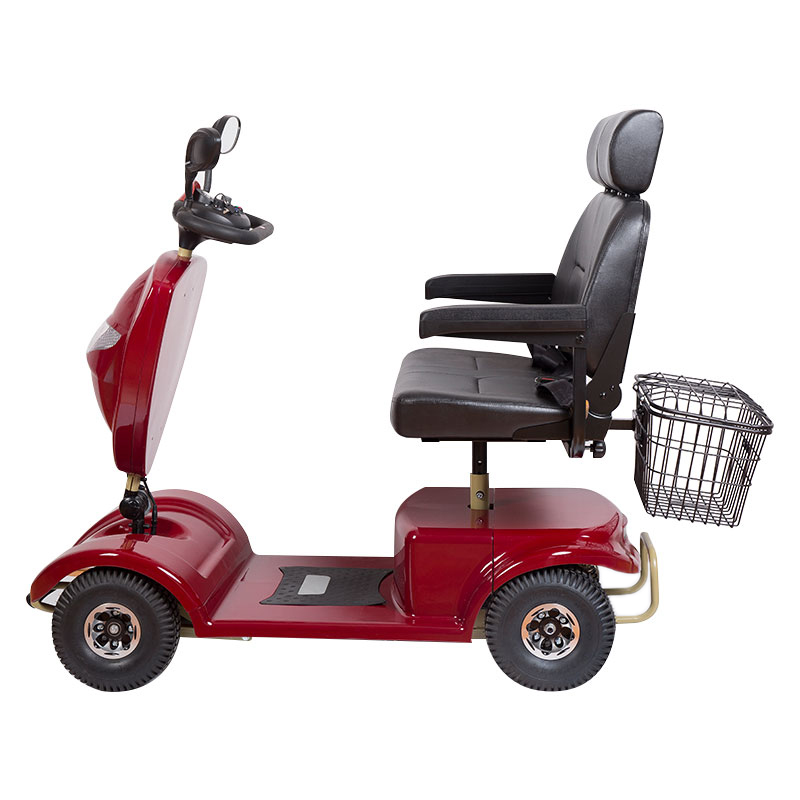Under what circumstances should seniors avoid using elderly mobility scooters for travel?
Elderly mobility scooter, as a convenient means of transportation, provides many elderly people with the convenience of travel. However, not all situations are suitable for elderly people to use mobility scooters for travel. Here are some situations in which elderly people should avoid using mobility scooters for travel to help everyone better understand and ensure the safety of elderly people's travel.
Elderly people should avoid using mobility scooters for travel when their physical condition is poor. For example, elderly people suffering from serious cardiovascular diseases, osteoporosis, or arthritis may have impaired balance, reaction speed, and judgment, increasing the risk of accidents when using mobility scooters. In such cases, elderly people should prioritize other safer means of travel, such as taking public transportation or traveling with family members.
Elderly people should also avoid using mobility scooters for travel when their vision or hearing is impaired. Poor vision may prevent elderly people from accurately judging traffic signals and road conditions, while hearing impairment may prevent them from hearing surrounding warning sounds or vehicle horns in time. In such cases, using mobility scooters increases the risk of traffic accidents, so they should be avoided as much as possible.

Similarly, it is not suitable for elderly people to use mobility scooters for travel when they are not familiar with traffic rules or road conditions. Traffic rules are the foundation of traffic safety, and if elderly people are not familiar with or understand traffic rules, it is difficult for them to respond correctly to traffic conditions. At the same time, unfamiliarity with road conditions may also lead elderly people to travel on roads unsuitable for mobility scooters, increasing safety risks. Therefore, before using mobility scooters, elderly people should familiarize themselves with relevant traffic rules and road conditions.
After drinking alcohol or taking drugs that affect driving, elderly people should also avoid using mobility scooters for travel. Alcohol and certain drugs may affect the nervous system and reaction capabilities of elderly people, making it difficult for them to accurately judge and handle traffic conditions. In such cases, accidents are more likely to occur when elderly people use mobility scooters, so driving mobility scooters after drinking alcohol or taking drugs should be strictly prohibited.
Finally, elderly people should try to avoid using mobility scooters for travel in adverse weather conditions or environments with dim lighting at night. Adverse weather conditions such as strong winds, heavy rain, and heavy snow may cause slippery roads and low visibility, increasing the difficulty and risk of driving; while at night or in dim lighting conditions, the vision of elderly people may be impaired, making it difficult to see road conditions and traffic signals. In these situations, elderly people should choose other safer means of travel to ensure their safety.
Elderly people should avoid using mobility scooters for travel when their physical condition is poor. For example, elderly people suffering from serious cardiovascular diseases, osteoporosis, or arthritis may have impaired balance, reaction speed, and judgment, increasing the risk of accidents when using mobility scooters. In such cases, elderly people should prioritize other safer means of travel, such as taking public transportation or traveling with family members.
Elderly people should also avoid using mobility scooters for travel when their vision or hearing is impaired. Poor vision may prevent elderly people from accurately judging traffic signals and road conditions, while hearing impairment may prevent them from hearing surrounding warning sounds or vehicle horns in time. In such cases, using mobility scooters increases the risk of traffic accidents, so they should be avoided as much as possible.

Similarly, it is not suitable for elderly people to use mobility scooters for travel when they are not familiar with traffic rules or road conditions. Traffic rules are the foundation of traffic safety, and if elderly people are not familiar with or understand traffic rules, it is difficult for them to respond correctly to traffic conditions. At the same time, unfamiliarity with road conditions may also lead elderly people to travel on roads unsuitable for mobility scooters, increasing safety risks. Therefore, before using mobility scooters, elderly people should familiarize themselves with relevant traffic rules and road conditions.
After drinking alcohol or taking drugs that affect driving, elderly people should also avoid using mobility scooters for travel. Alcohol and certain drugs may affect the nervous system and reaction capabilities of elderly people, making it difficult for them to accurately judge and handle traffic conditions. In such cases, accidents are more likely to occur when elderly people use mobility scooters, so driving mobility scooters after drinking alcohol or taking drugs should be strictly prohibited.
Finally, elderly people should try to avoid using mobility scooters for travel in adverse weather conditions or environments with dim lighting at night. Adverse weather conditions such as strong winds, heavy rain, and heavy snow may cause slippery roads and low visibility, increasing the difficulty and risk of driving; while at night or in dim lighting conditions, the vision of elderly people may be impaired, making it difficult to see road conditions and traffic signals. In these situations, elderly people should choose other safer means of travel to ensure their safety.


 English
English Deutsch
Deutsch







-3.jpg?imageView2/2/format/jp2)
.jpg?imageView2/2/format/jp2)






